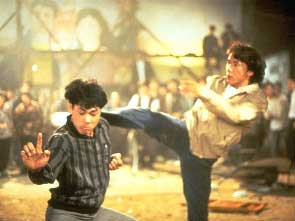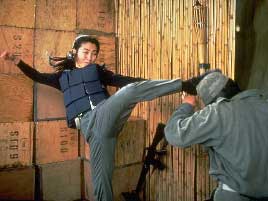
HK Cinema - 1992
In 1992, Jackie Chan made the third installment in his Police Story saga - Supercop. It is noteworthy for a few reasons. First, it is a terrifically fun film - though it sort of marks a point in Jackie's career where his films take on a more Western tinge to them and the martial arts aspects are minimized. This trend was to continue with Mr Nice Guy and First Strike.

Second, the film marked the return of Michelle now Yeoh. She had retired back in the late 1980's upon her marriage to Dickson Poon after revving up the "girls with guns" genre. Things did not work out between the married couple (thankfully for movie goers !). She discarded her film name of Khan and went with her real one. Amazingly, after the four year layoff she looked lovlier than ever - having lost a bit of baby fat, but she also was more graceful than ever. It was a great comeback film - under the direction of her friend Stanley Tong - and Jackie allowed her more leeway than any other female in one of his films. Michelle has gone on to make a number of other films - the classics Wing Chun and the Heroic Trio being the best. Recently, she of course was in Bond's Tomorrow Never Dies.

Another interesting aspect to this film was the fact that it is the first time that Jackie did a synch sound film. That means that the sound is being recorded while the film is shot. In all other Jackie Chan films, the dialogue was dubbed later and amazingly someone else always did Jackie's voice. So this is the first time that you get to hear Jackie's real voice.
This brings up the interesting subject of synch sound and dubbing with HK films. In fact most HK films were being dubbed. There were certain reasons for this - it is cheaper to do it this way, the noise of both HK and the closeness of the movie sets made it difficult to record sound, and the different dialects of the actors made it problematic. Depending on whether the film was being done in Cantonese or Mandarin, it was always likely that some of the actors were not fluent in the language of the film. Thus they would have to be dubbed later. Many actors have had their voices dubbed by someone else at one time or another. Jet Li was always dubbed leading to a rumor that he had a very feminant voice. Lately more and more HK films are going to synch sound, but many are still being dubbed.
Tim supplied the following information - please check out his HK film site A Page from Home:
"Supercop" was the first synch sound Jackie Chan movie, I believe. Author Paul Fonoroff's SCMP review mentioned the synch sound, adding that it was "...the first time Chan's own voice has been used in a Cantonese-dialogue movie (there have been some English synchronic features), and his vocal character is so pleasantly distinctive that one wonders why he waited so long."
But I doubt it was the first modern one -- Wong Kar-wai's "Days of Being Wild" (1990) is certainly in synch sound.
Where does the definition of "modern" start? If you include the 1980s (i.e. post-kungfu, etc) then you have the new wave films from the early 1980s like "The System" by Peter Yung that were often in synch sound. Allen Fong's "Father and Son" (1981), for example, was done in synchronous sound recording (and it sounds great too!).
If you're interested, here's some info on dubbing older films:
Xu Zhenghong speaking on the late 1940s HK films: "Yong Hua was the best studio in those days since they had American equipment, so major productions such as The Soul of China and Sorrows of the Forbidden City (both 1948) were shot there. We seldom went on location because we used synchronised recording. A sound technician used to record the dialogue, adjust the volume controls and orchestrate the sound effects at the time. Scripts in those days were seldom altered once they were finished, so he simply had to follow the specifications..." (From "A Study of the Hong Kong Swordplay Film (1945-1980)"). [ BTW, the Yong Hua studio (1948-1957) was reportedly the most modernised studio in HK at the time, with two soundstages.]
Raymond Chow on reforms at Shaw's Studios: "...another reform, which may be criticised today, was the decision not to use synchronous sound recording. Shaw Brothers had ten production studios, when one was in the process of shooting, the bell would be rung and this would stop activities elsewhere, wasting a lot of time..." (From The Hong Kong Film Archive newsletter)
But, of course, synch sound didn't stop
outright – both Princess Chang Ping and Legend of the Purple
Hairpin (1970s) are in synch sound, for example, though admittedly
they are Cantonese opera movies!